

The perfect game. Practical Mulligans by Adam Yurchick - Magic the Gathering (MTG) Adam Yurchick 6/10/2014 10:00:00 AM The best way to get an edge in Magic is not in deck selection, but in playing a deck to its fullest capacity.
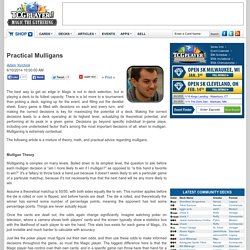
There is a lot more to a tournament than picking a deck, signing up for the event, and filling out the decklist sheet. Every game is filled with decisions on each and every turn, and making the correct decisions is key for maximizing the potential of a deck. » PV’s Playhouse – Learning to Play Lands. Hello!

Before we start with this article, take a look at this picture. This is a screenshot from one of my Return to Ravnica draft videos. Your turn has just started—you haven’t done anything yet. Tell me what your play is (it’s very simple). Done? Embarrassing, isn’t it? You could argue that I made the wrong decision in playing the Forest over the Plains. That is usually the case when it comes to playing lands—we don’t think. Playing Land Number One Playing your first land has two impacts on the game—it changes what you’re able to play in the following turns, and it gives the opponent information. Sometimes, it’s not always clear. [draft]Kird Ape Lightning Helix Tribal Flames Geist of Saint Traft Tarmogoyf Arid Mesa Scalding Tarn[/draft] With a hand like this, you HAVE to take a moment to see what you’re going to do—it’s impossible to play this game on autopilot.
Now, imagine that you have the same hand, but your lands are both [card]Scalding Tarn[/card]s. The problem? Play Your Lands! Alexandria.tue.nl/extra2/760434.pdf. Of Math and Magic – The Hypergeometric Distribution by Chris Mascioli. One of my main sources of inspiration is when I believe others are doing something wrong.
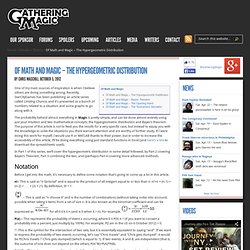
Recently, StarCityGames has been publishing an article series called Limiting Chance, and it’s presented as a bunch of numbers related to a situation and some graphs to go along with it. The probability behind almost everything in Magic is pretty simple, and can be done almost entirely using just your intuition and two mathematical concepts: the hypergeometric distribution and Bayes’s theorem. Of Math and Magic – Bayes’ Theorem by Chris Mascioli. You’re sitting in the lobby of a hostel in the middle of Scotland, and a new batch of guests walks through the door.
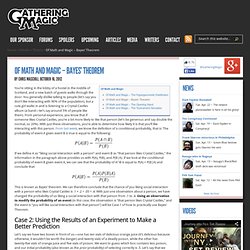
You generally dislike talking to people (let’s say you don’t like interacting with 90% of the population), but a cute girl walks in and is listening to a Crystal Castles album (a band—let’s say around 5% of people like them). From personal experience, you know that if someone likes Crystal Castles, you’re a bit more likely to like that person (let’s be generous and say double the normal, so 20%). With just these observations, you’re able to determine how likely it is that you’ll like interacting with this person. Of Math and Magic – The Opening Hand by Chris Mascioli. The original idea for this installment was to cover a whole game of Return to Ravnica Limited and cover the odds of drawing cards from your own deck along with predicting your opponent’s behavior, but the number of things that came up just with the opening hand was high enough that I decided to commit a whole piece on just hitting land drops based on your starting seven.
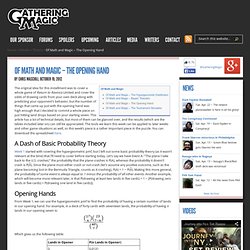
This article has a lot of technical details, but most of them can be glanced over, and the results (which are the tables included later on) can still be appreciated. The tools we learn this week can be applied to later weeks and other game situations as well, so this week’s piece is a rather important piece in the puzzle. You can download the spreadsheet here. A Dash of Basic Probability Theory Week 1 started with covering the hypergeometric pmf, but I left out some basic probability theory (as it wasn’t relevant at the time) that I’ll need to cover before starting today. Opening Hands. Of Math and Magic – The Tournament Simulator by Chris Mascioli. Editor's Note: This article features equal parts code and results, shared in the form of a story.
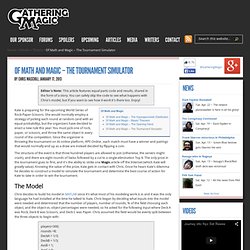
You can safely skip the code to see what happens with Chris's model, but if you want to see how it work it's there too. Enjoy! Kate is preparing for the upcoming World Series of Rock-Paper-Scissors. She would normally employ a strategy of picking each round at random (and with an equal probability), but the organizers have decided to enact a new rule this year: You must pick one of rock, paper, or scissors, and throw the same object in every round of the competition. Since the organizer is throwing the tournament on its online platform, RPS Online , each match must have a winner and pairings that would normally end up as a draw are instead decided by flipping a coin.